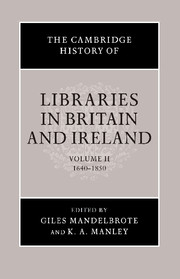Book contents
- Frontmatter
- 1 Introduction: the changing world of libraries – from cloister to hearth
- PART ONE THE EXPANSION OF BOOK COLLECTIONS 1640–1750
- PART TWO LIBRARY DEVELOPMENT AT A LOCAL LEVEL
- 15 Libraries for sociability: the advance of the subscription library
- 16 Local library provision: 1 Norwich
- 17 Local library provision: 2 Belfast
- PART THREE PROVINCIAL AND METROPOLITAN LIBRARIES 1750–1850
- Select bibliography
- Index
- References
17 - Local library provision: 2 Belfast
from PART TWO - LIBRARY DEVELOPMENT AT A LOCAL LEVEL
Published online by Cambridge University Press: 28 March 2008
- Frontmatter
- 1 Introduction: the changing world of libraries – from cloister to hearth
- PART ONE THE EXPANSION OF BOOK COLLECTIONS 1640–1750
- PART TWO LIBRARY DEVELOPMENT AT A LOCAL LEVEL
- 15 Libraries for sociability: the advance of the subscription library
- 16 Local library provision: 1 Norwich
- 17 Local library provision: 2 Belfast
- PART THREE PROVINCIAL AND METROPOLITAN LIBRARIES 1750–1850
- Select bibliography
- Index
- References
Summary
Although there is evidence from pre-Christian times of human settlement on the site of Belfast, and the existence of a church is recorded in a papal roll of 1308, it was not until the Elizabethan period that the place began to have any real significance. Its name in Irish, Beál Féirsde, which translates as ‘at the mouth of, or the approach to the sandbank’, gives the clue to its strategic importance. The sandbank where the rivers Farset, Lagan and Blackstaff enter the Irish Sea made possible a crossing at low tide between Upper and Lower Clandeboye (the present-day counties of Antrim and Down). Elizabeth granted the settlement and its surrounding lands to Arthur Chichester for his part in the defeat of Hugh O’Neill, earl of Tyrone, who had risen in rebellion against the English crown. The plantation of Antrim and Down by lowland Scots and the flight of the last of the Irish earls in 1607 prompted Chichester to begin the laying out of the town and the rebuilding of the castle. In 1613 James I created Chichester baron of Belfast and in the same year granted Belfast its charter. This allowed it to return two members to the Irish parliament, but more importantly created a system of municipal government which was to serve the town for the next 200 years. It created the offices of sovereign (mayor) and twelve burgesses who had the power (subject to the veto of the Chichester family) to make by-laws and admit freemen. The freemen had no part in municipal government but were permitted to carry on their trade free of the tolls and customs imposed on strangers.
- Type
- Chapter
- Information
- The Cambridge History of Libraries in Britain and Ireland , pp. 275 - 282Publisher: Cambridge University PressPrint publication year: 2006

